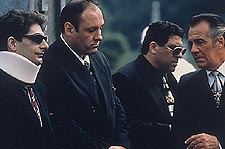
To his shrink, the middle-aged man with a midlife crisis reports this dream: His belly-button rotates, like a Phillips-head screw, after which his penis falls off. And then, while he’s looking for a guy who used to work on his Lincoln Town Car, some bird swoops down and flies away with his unscrewed manhood. The shrink wants to know: What kind of bird? Maybe a seagull, says the man. Or a pelican or flamingo. If we’re talking water birds, suggests the shrink, why not ducks? This is interesting news from the subconscious front for the middle-aged man, Tony Soprano. Not long ago, a couple of wild ducks from Canada landed in his swimming pool in north Jersey, where they hatched ducklings, after which they, too, flew away. His family made fun of his obsessive interest in these ducks: “Birdman, hello?” So it’s just possible that his fainting spells – when it feels as if his skull fills up with ginger ale – are separation-anxiety attacks.
On the other hand, business is also bad. “We used to be recession-proof,” Tony says to one of his subordinates in the strip joint where they gather to squeeze their vicissitudes like an accordion: “No more. And we can’t blame it all on the Justice Department.” Tony (James Gandolfini) is a waste-management consultant – which is to say, if not a mob boss, at least a middle-management mafioso. He has two families to worry about. One includes his wife, Carmela (Edie Falco); his daughter, Meadow (Jamie Lynn Sigler); his son, Anthony Jr. (Robert Iler); and his widowed mother, Livia (Nancy Marchand). The other consists of his “uncle” Junior (Dominic Chianese), his nephew Christopher (Michael Imperioli), his godfather “Jackie” (Michael Rispoli), and assorted gun-toting ugly ducklings like Silvio Dante (Stevie Van Zandt, from Springsteen’s E Street Band). We will be spending thirteen weeks with these Sopranos (Sundays, starting January 10; 9 to 10 p.m.; HBO), of which I’ve seen the first agreeable four.
It is the inspired whimsy of executive producer David Chase that, after a cat scan can’t turn up anything physiologically wrong with him, a wiseguy should seek psychiatric help to cure him of a stress-related tendency to swoon. And it is Chase’s inspired casting that gives us Lorraine Bracco as Dr. Jennifer Melfi, the designated therapist. (Remarkably, she manages to combine the prurience of Tracey Ullman on Ally McBeal with the pizzazz of Patty D’Arbanville on New York Undercover, while also being very sexy behind her repressive Robespierre wire-rims.) And it’s Chase’s credentials – Northern Exposure, the Rockford Files movie, etc. – that doubtless account for the wry-crisp tone of the farcical proceedings. Not since Mary Hartman, Mary Hartman has there been a prime-time series so loopily insouciant, so tuned in to the American static, as if picking up its signals from a plate in Robin Williams’s head.
So therapized baby talk meets Francis Ford Coppola. In Sopranos, mobsters are singing for their supper club. They quote not only from the various Godfather screenplays – identifying the source by part, in shorthand, as “One,” “Two,” or “Three” – but also from Scarface. Gandolfini’s Tony has couch-potato doubts: “Gary Cooper wasn’t in touch with his feelings; he did what he had to.” Van Zandt’s Dante is permanently furious about “the rape of Italian culture” – the fact that when everybody eats pizza “they’re stealing the gift of our cuisine.” Falco’s Carmela is in favor of Prozac: “Change can be a positive,” especially since “our existence on this earth is a puzzle.” Chianese’s Junior, aspiring to dondom, doesn’t want a bloodbath: “Take it easy, we’re not making a Western here.” Imperioli’s Christopher seeks to better himself through the “positive visualization” of his thoughts. To her lawyer boyfriend, Bracco’s shrink complains about men: “We tell you to be more sensitive, and you join Promise Keepers.” And Marchand’s Livia, insisting that a “retirement community” is really just a nursing home, is a pain in the Oedipus complex: “Four grand a month,” says Tony, “and she pretends she’s an Eskimo pushed out to sea.”
Meanwhile there’s garbage to manage, as well as construction, protection, extortion, and loan-sharking to consult about. And the deadbeat who works for an HMO that maybe they can use to launder money through dummy clinics. And a free Caribbean cruise, courtesy of the Kitchen and Restaurant Workers’ Union. And the firebombing of Vesuvio’s. And rico, which Bracco mistakes for one of Tony’s business pals. Not to mention the gay Hispanic lovers who steal the high-school science teacher’s car; the girls, including Meadow, who score amphetamines to keep themselves awake all night while studying for the SATs they need to ace to get into Berkeley; and the Hasidim who want to hire some local muscle to encourage a divorce.
This is of course pulped fiction. While it’s funny – pork sausage and Masada jokes – it’s also violent. Considering how Tony really feels about his Shelley Winters of a mother, when he dreams a transference dream during which she morphs into his therapist, we have a right to fear for both women. (Didn’t his father die “squeaking like a gerbil”?) But so far, Sopranos seems to be suggesting rather more gently that there’s not much to distinguish between the Mafia and, say, an HMO. Nor, for that matter, between, say, Willy Loman and a “waste-management consultant.” At the strip joint, at the shrink’s, in the bedroom, or out-of-doors at any of the many barbecues where these made men in Bermuda shorts char and sauce their roadkill Gandolfini (Get Shorty), intimating his own mortality, is a marvel of baffled machismo – as it were, a ruptured duck.